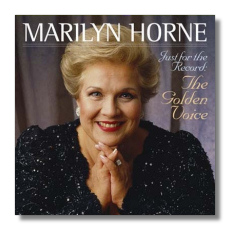
The Internet's Premier Classical Music Source
Related Links
- Latest Reviews
- More Reviews
-
By Composer
-
Collections
DVD & Blu-ray
Books
Concert Reviews
Articles/Interviews
Software
Audio
Search Amazon
Recommended Links
Site News
 CD Review
CD Review
Marilyn Horne

Just For the Record - The Golden Voice
- Arias and scenes from: Carmen, Samson et Dalila, Semiramide, L'italiana in Algeri,
Semele, Rodelinda, Orfeo ed Euridice, Le prophète, Mignon, La donna del lago,
Meraspe, Lucrezia Borgia, Norma, Il trovatore, La Gioconda, and West Side Story - Songs by Schubert, Schumann, Wagner, Nin, Copland, Malotte, Foster, and "Traditional."
Marilyn Horne, mezzo-soprano
Various accompaniments and supporting singers
Decca 4761223 ADD 2CDs 79:21, 78:34
Fabulous Marilyn Horne turned 70 in January 2004, the month in which this CD was released. She still gives recitals, although she now performs vintage American popular music and folk songs instead of the operatic repertoire and otherwise heavier music that made her famous. Now much of her time is devoted to teaching, and to the work of the Marilyn Horne Foundation, a non-profit organization that cultivates the art of the vocal recital and classical song.
One of Horne's first big breaks was "voicing" Dorothy Dandridge in 1954 film of Carmen Jones. Soon after, the young Pennsylvania-born singer moved to Germany and took on soprano roles with a regional opera house, including Mimi in La bohème and Tatjana in Eugene Onegin! As news of her talents spread, Marie in Berg's Wozzeck became her calling card role, and Marie brought her back to the United States (specifically, the San Francisco Opera) in 1960, and to Covent Garden in 1964. Throughout the 1960s, however, she returned to mezzo territory and became increasingly associated with the music of Rossini and Handel, and with the bel canto repertoire, where she frequently sang beside Joan Sutherland. It was with Sutherland and Bellini's Norma that she made her "Met" debut in 1970. Other highlights of her career in New York include Carmen, Le prophète, and, in 1984, Handel's Rinaldo – the first time a Handel opera had been performed by the Met!
Many writers have called Horne the most influential or important American singer in the latter half of the 20th century, or even in history. There's no question that she has one of the most distinctive voices, from its awesome bottom to its brilliant top. It's hard to mistake it for anyone else's. It is a joy to hear her fearlessly rip through Rossini's complicated roulades and the ornate figurations Donizetti gave to his heroines (or in this case, heroes). She is no less imposing in the French repertoire. Her "O Prêtres de Baal… O toi, qui m'abandonne" from Le Prophète is immensely exciting, and "Elle est là! Près de lui!" from Mignon shows off high notes many sopranos would kill to have at their disposal. Horne also excels in the more intimate songs, including the old-fashioned goodness of Malotte's The Lord's Prayer and the American folksong Shenandoah.
With the exception of Carmen's opening aria and "Somewhere" from West Side Story (both from Deutsche Grammophon), everything on this impressive and representative collection was released on the London/Decca label between approximately 1964 and 1986. There are 32 selections – 22 from opera, and the remainder songs. Decca has raided Horne's recital discs heavily, and a few of her recordings of complete operas as well. At first I was concerned by the seemingly indiscriminate mixing of French and Italian repertoire on the first disc, but the recording producer knew what he was doing, because the sequencing makes more sense to the ear than it does to the eye.
The sound is beautiful throughout – is it my imagination, or are Universal's digital remasterings of analog material getting better all the time? The aforementioned unsigned booklet note is informative, and there are some priceless photos of the young singer. There are no texts and translations. The only thing in the least troublesome about this release is the title, or rather, the titles. One would have been enough, Decca!
Copyright © 2004, Raymond Tuttle




















